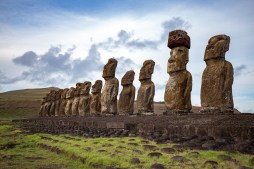From Plato to Today: How Theories About Atlantis Have Evolved Over Time
The legend of Atlantis, a mythical island described by the ancient philosopher Plato, has sparked curiosity and debate for centuries. Its story, which revolves around a powerful civilization that ultimately fell from grace and sank beneath the waves, has inspired countless theories about its existence. This article will explore how these theories have evolved over time, offering insights into the enduring fascination with Atlantis.
Plato’s Account of Atlantis
The tale of Atlantis first appeared in Plato’s dialogues “Timaeus” and “Critias”, written around 360 B.C. In these works, he describes Atlantis as a powerful and advanced civilization that existed about 9,000 years before his time. According to Plato, this utopian society was located beyond the Pillars of Hercules (modern-day Strait of Gibraltar) and was known for its impressive architecture and vast wealth. However, due to moral decay and hubris, Atlantis supposedly fell out of favor with the gods and was submerged into the ocean. Plato’s account is often regarded as a cautionary tale rather than a historical fact.

Early Interpretations
Following Plato’s writings, many scholars attempted to locate Atlantis based on his descriptions. In the Renaissance period, thinkers like Francis Bacon interpreted it as an allegory for human ambition and societal flaws rather than a literal place. Others speculated that certain civilizations such as Minoan Crete or even parts of North Africa might have inspired the myth due to their advanced cultures around that era. This marked one of the earliest phases in which interpretations began to deviate from strictly philosophical readings to more geographical explorations.
Modern Archaeological Perspectives
In the 19th century onward, archaeological discoveries ignited renewed interest in locating Atlantis amid real historical contexts. Excavations at sites like Santorini (formerly Thera) revealed advanced Minoan civilizations that faced catastrophic volcanic eruptions—a theory suggesting perhaps this island could have been what inspired Plato’s tale. Additionally, researchers like Ignatius Donnelly proposed radical ideas connecting various ancient cultures through shared myths about great floods—further intertwining history with legend.
Contemporary Theories: Myth or Reality?
Today’s theories reflect an eclectic blend of scientific inquiry mixed with fantastical speculation. Some have suggested locations ranging from Antarctica to various islands across Europe and beyond based on geological anomalies or ancient maps’ interpretations—each claiming potential evidence supporting their claims about lost civilizations akin to Atlantis. However, most experts maintain skepticism regarding these assertions without concrete archaeological proof backing them up.
The Enduring Legacy
Regardless if it ever truly existed or not, the story of Atlantis continues captivating our imagination across literature, film adaptations (like Disney’s animated version), games (such as Bioshock), and more recently through popular documentaries exploring its mysteries further fueling public intrigue over time. As we continue exploring our past through new lenses while holding onto fragments left behind by ancients—perhaps that makes us all just a little bit connected back towards those lost tales like Atlantean lore itself.
In conclusion, while discussions around whether ‘Atlantis really existed’ persist today—the evolving narratives since Plato highlight humanity’s quest for understanding our origins amidst timeless mythologies reflecting wisdoms yet uncovered within history itself.
This text was generated using a large language model, and select text has been reviewed and moderated for purposes such as readability.











